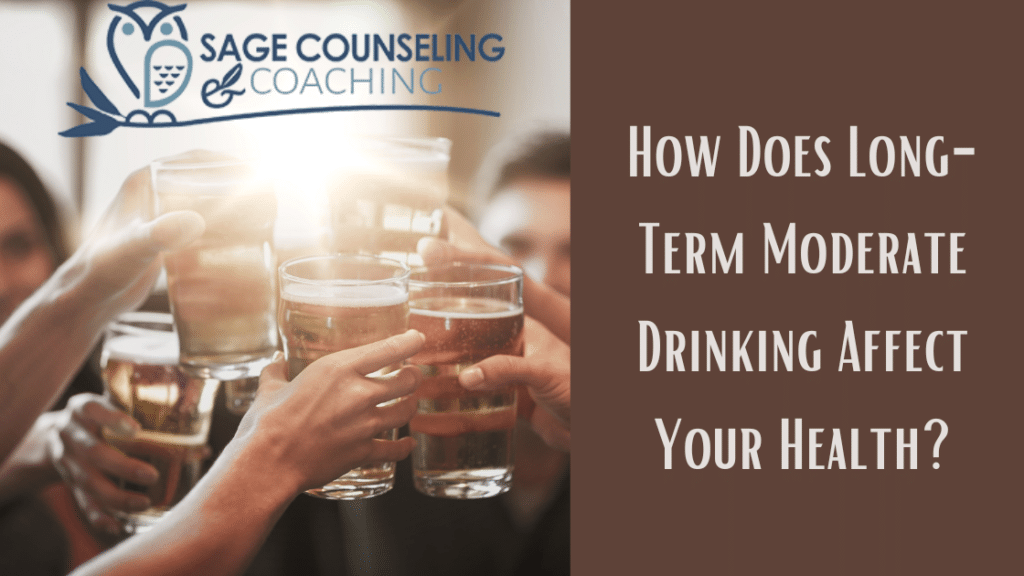
Alcohol is both tonic and toxic, which is determined by the dose. Moderate drinking benefits the heart and circulatory system, protecting against type 2 diabetes and gallstones. However, heavy drinkers can experience death caused by fatal traffic accidents or alcohol poisoning. In addition, heavy drinking causes harm to the liver and heart; in pregnant women, it can affect the unborn child, increasing the risk of breast cancer and other forms of cancer. It also triggers depression and violence and interferes with most relationships. Alcohol is a two-faced nature that brings surprises that ain’t surprising. Ethanol is an active beverage molecule that alters the body’s function by influencing the brain, stomach, heart, and liver. However, moderate drinking has a better effect, and this article will explain the long-term effect of moderate drinking on a person’s health.
Defining moderate
The misuse of moderate drinking has resulted in ongoing debates on the health impact of the beverage. Some debates suggest that moderate drinking is less than a drink per day, while others contend that it is 3 to 4 drinks per day. However, alcohol researchers have yet to conclude on an acceptable standard of drinking. The controversy is because alcohol is fairly fluid. Americans take 1 drink which constitutes 12 ounces of beer, 5 ounces of wine, or 1 ½ ounces of spirit. Each measurement gives the body 12 to 14 grams of alcohol, but there are other ways since some alcohols have different content.
In essence, moderate drinking is a balancing act where the health benefits outweigh the risk. In conclusion, men should take 1 to 2 drinks, and women should focus on 1 drink per day.
Examples of one drink include:
- Beer: 12 fluid ounces (355 milliliters)
- Wine: 5 fluid ounces (148 milliliters)
- Distilled spirits (80 proof): 1.5 fluid ounces (44 milliliters)
Health Benefits of Long-Term Moderate Alcohol Intake
Moderate drinking of the beverage has potential health benefits. Much data show convincing information that alcohol prevents heart diseases, especially in middle-aged and older adults. More than twenty-nine studies show that moderate intake helps fight coronary heart disease, which is 30 percent higher healing in people that consume alcohol compared to those that don’t.
Other studies show that the consumption of alcohol moderately reduces the risk of stroke and even death resulting from cardiovascular and heart disease. However, the chances of reduction are in different percentages. There is also scientific evidence that moderate alcohol intake helps fight metabolic syndrome, gallstones, and type 2 diabetes. In addition, it also aids digestion, creates comfort and relaxation, and influences social interactions. The benefits reach all aspects of health in a human. The benefits are higher in younger adults, unlike pregnant women. However, the risk of moderate alcohol intake is less in pregnant women compared to its benefits. Keep in mind that people on medication that interact with alcohol should not partake in drinking, and those unable to maintain a moderate amount should not drink.
Please call Sage Counseling and Coaching so YOU can get the support you deserve and need with a Recovery Coach.
Explore More About Sage Counseling and Coaching
- Your Brain on Drugs
- Is Intervention Really a Good Tool to Get Sober?
- Is it Just “Pot?”
- Al-Anon Can Help Alcoholic Families!
- Betrayal Trauma Therapy in Issaquah – How to Start the Healing Process
- Substance Abuse Types – Get a Counselor in Washington
- Addiction Counseling Near Me in Issaquah – Group vs. Individual Therapy
